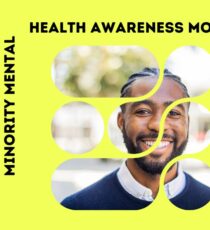
July in Minority Mental Health Awareness Month. This week we’re discussing the importance of managing negative thoughts. Giving into negative thoughts and self-doubt are huge deterrents to achieving emotional health and maintaining contentment. Our thoughts also influence our behavior and negative ones can hinder the ability to make positive changes and achieve goals. Cognitive Behavior Therapy or CBT focuses on navigating thoughts and beliefs as they relate to the interpretation of events that influence the behavior that follows.
Michigan State University describes CBT:
The goal of cognitive behavior therapy is to teach individuals that while they cannot control every aspect of the world around them, they can take control of how they interpret and deal with things in their own environment. The basic premise is that people often have thoughts or feelings that perpetuate problematic or destructive beliefs and these faulty beliefs can affect functioning and relationships at home, work, school and in the community at large.
The premise of CBT and the significance of maintaining balanced thoughts is imperative to developing positive emotional health. Reframing and challenging negative thoughts or feelings of self-doubt is an effective way to practice CBT and shift your mindset and mood.
Reframing your thoughts is simply looking at them with a different point of view that allows other possibilities and truths to be considered. It’s also a way to shift your focus from the negative to something more effective and empowering.
For instance, instead of calling yourself a failure because you didn’t perform well at a certain task, you can choose alternative ways to reposition your feelings and tell yourself, “Next time I can do better” or,
“This isn’t where my talent lies, but I’m good at other things.”
Some other examples of how to reframe your thoughts are:
I hate my job
Though I’m not happy at my job I can find one that is a better fit.
This statement allows you to focus on the solution instead of the problem.
My social life isn’t fulfilling.
Right now I have time for myself and focus on some things I really enjoy on my own.
This statement allows you to see the positive aspect of having more time for yourself.
I’m fat.
I weigh more than I’d like right now but I have the ability to change that.
This statement allows you to take the judgement off yourself and focus on your goal.
I’m broke.
I don’t have as much money as I would like right now but I can find a way to earn more.
Another component of reframing your thoughts is challenging them. When you have a negative or harmful thought simply ask yourself “Is this true?”
Some examples are:
I will never get caught up on my bills.
Is this true? It may take hard work and patience but I can find a way to make more money and pay things off in time.
I will never find the right partner.
Is this true? In time it is very possible to meet the right person for me.
I will never be happy.
Is this true? It may feel that way now but I can do the personal work as well as work on areas of my life that contribute to my unhappiness and change them.
All these statements challenge the validity of these thoughts and take the power from them and give it back to you.
Monitoring our thoughts is just as important to our health as diet and exercise. It is critical to watch what we tell ourselves and not slip into false beliefs based on perceptions that aren’t valid. Changing how we think isn’t easy, but definitely possible. It takes consistent practice. So next time you find yourself giving into a negative thought or self-doubt, try and remember to stop yourself and think of an alternative that feels more empowering. Be kind to yourself.






Social Menu